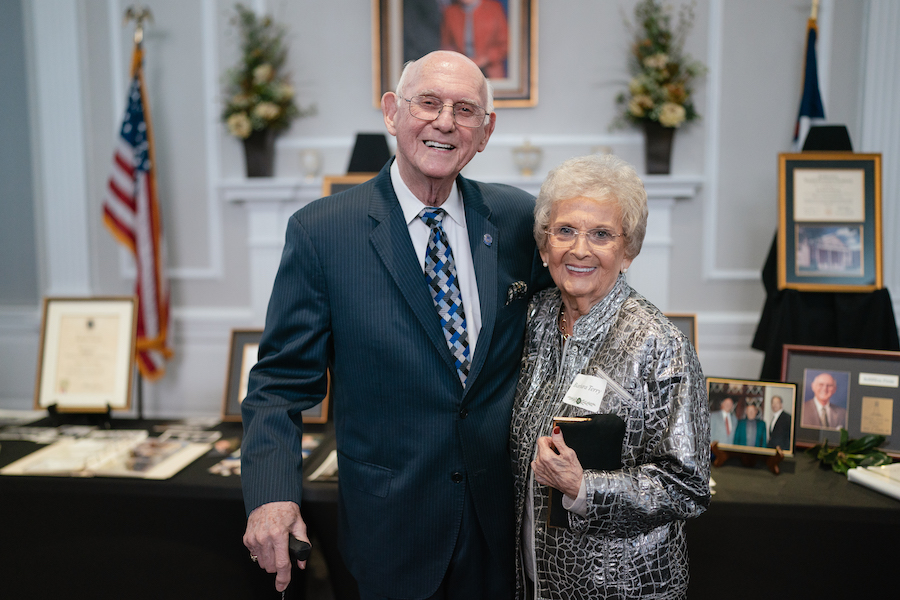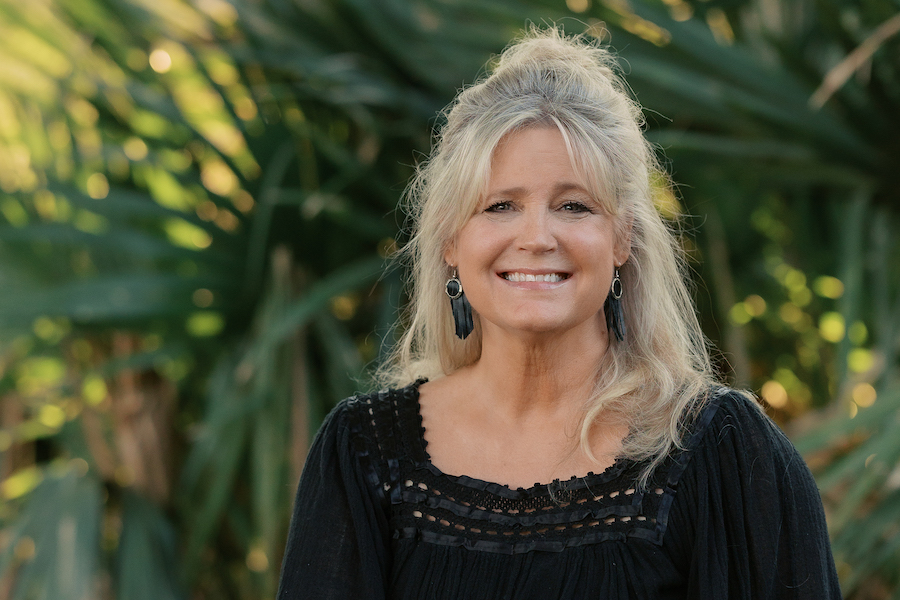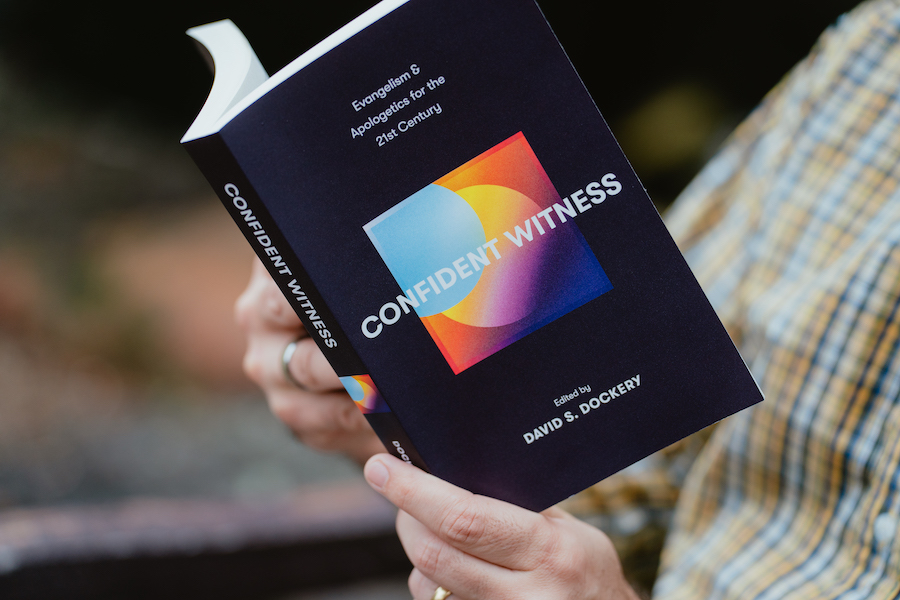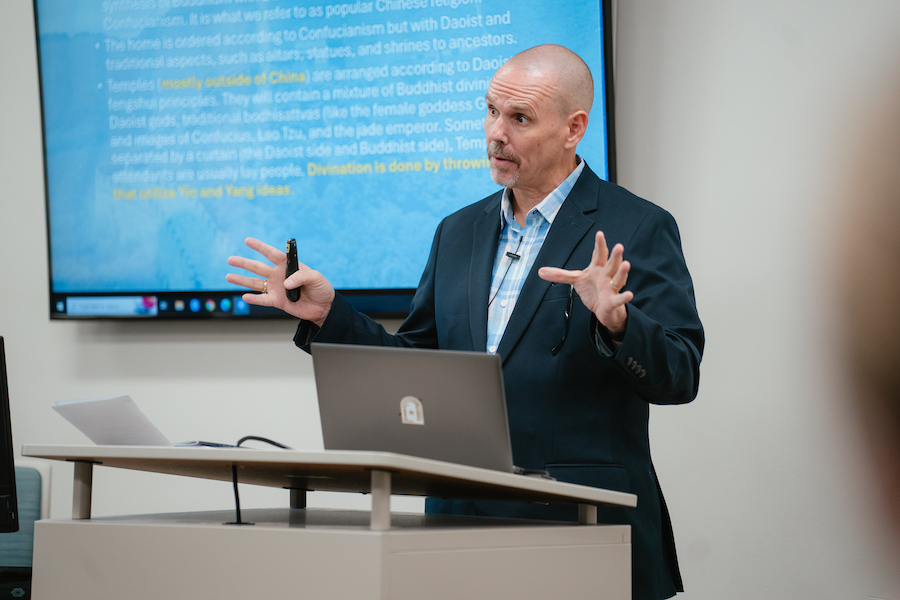Yarnell exhorts Southwestern community to recover three-fold heritage in Founder’s Day address
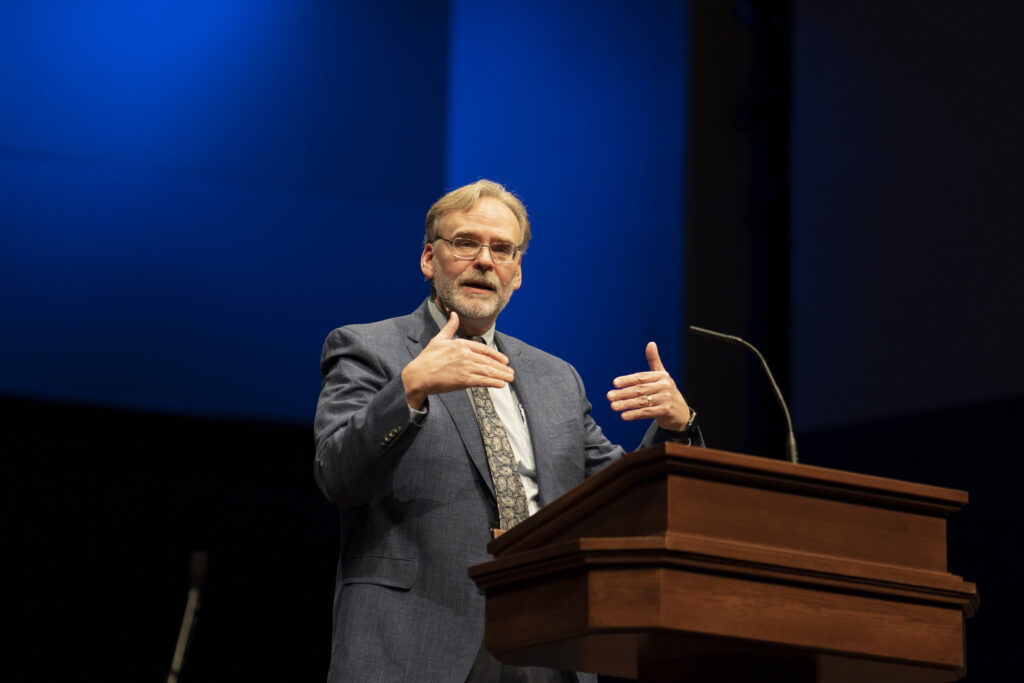
Encouraging the Southwestern Baptist Theological Seminary community to recover the “three necessary strands” of its identity, including evangelical faith, soul-winning in all areas of ministry, and “Baptist family ways,” Research Professor of Theology Malcolm B. Yarnell III recalled the foundations of the Fort Worth institution during his Founder’s Day address on March 9.
The Founder’s Day chapel service, which is commemorated annually nearest to the anniversary of the seminary’s March 14, 1908, charter was followed by a luncheon honoring Louie and MeiFeng Lu and David and Marcia McQuitty as recipients of the B.H. Carroll Award and L.R. Scarborough Award, respectively. The awards annually honor persons who have provided significant financial support for Southwestern.
“We offer thanks to God for every person who has influenced this place, who has invested in this place, who has shaped this wonderful institution that we now have the wonderful privilege of being a part of on this day,” said David S. Dockery, interim president, in his welcome to the gathering that included faculty, staff, students, alumni, donors, and members of the seminary’s board of trustees.
In his remarks, Dockery introduced a statement of the faculty of Southwestern Seminary and Texas Baptist College, the seminary’s undergraduate college, that “reaffirms” the faculty’s commitment to the core values of being scripturally grounded and confessionally guided. The values are two of six new core values that will be presented to the board of trustees at its April meeting. The other core values of the institution include being grace filled, Christ centered, student focused, and globally engaged.
The faculty statement on the scripturally grounded and confessionally guided core values was distributed to the chapel audience in a booklet and is also available on the seminary’s website.
Reflecting on the seminary’s founding, Yarnell noted the Fort Worth institution’s “theological heritage” includes the three components of “evangelical in doctrine, Baptist in structure or body … with a heart for soul-winning practical Christianity.”
Yarnell said the late James Leo Garrett Jr., Southwestern Seminary distinguished professor emeritus of theology, identified “three areas of doctrinal emphasis differentiate evangelicals,” including “the nature and necessity of justification or regeneration or salvation, the nature and supreme authority of the Bible, and the deity of Jesus Christ together with certain events of His ‘holy history,’ namely virginal conception, atoning death, bodily resurrection, and second coming.”
“The founding presidents, trustees, and faculty of Southwestern taught these three marks of evangelical identity,” Yarnell said, adding the seminary’s first president and founder, B.H. Carroll, “outlined … the requirements for trustees, faculty, and graduates” and required trustees and faculty to “subscribe and not seriously depart” from the “thoroughly evangelical” New Hampshire Confession of Faith, Yarnell added.
Additionally, Yarnell said in 1921 the Southwestern Seminary faculty “crafted a seven-article doctrinal statement” that “began with belief in the Bible as the Word of God” while dismissing the “rationalistic method of dealing with the Bible and evolutionary theory” while also affirming “the Genesis account.”
Yarnell noted Southwestern’s founders “emphasized the new birth and personal conversion” as they “proclaimed far and wide, ‘You must be born again.’” Echoing the words of the seminary’s second president, L.R. Scarborough, Yarnell said, “Let us see to it that our diplomas are a guarantee of character as well as a stamp of scholarship.”
“The name ‘Southwesterner’ must ensure evangelical integrity,” Yarnell added.
Recalling the “vision” of Carroll, Yarnell said the seminary’s founder “conveyed the heartbeat of our seminary.”
“Our moral responsibility here is to train preachers of the saving Gospel,” Yarnell said, as he recounted Carroll’s words at the founding of the institution: “It is our duty to pray for more laborers. It is our duty, and theirs, to train them for efficient service.”
Yarnell encouraged the Southwestern Seminary community to have hearts “compelled by the living God’s compassion for this world” that are also “emboldened with the Good News that His Son is risen” that “invite sinners to repent, believe, and be born again by the Spirit” and that “which speak truth, always with love.”
“We need hearts passionate for people, not against people,” Yarnell exhorted, noting the seminary’s “most influential book,” Scarborough’s With Christ After the Lost, “summarizes the spirit” of the institution.
“Our founders were not culture warriors set against the world in spite,” he added. “They were militant evangelists going after the lost in love. They pursued the world to win it to a living faith in a living Lord. This is the Southwestern way.”
Yarnell recounted that Carroll told Scarborough, “Keep the seminary lashed to the cross,” explaining that the cross “centers our evangelical faith in the gracious atoning work of our Savior” while the phrase “to keep” emphasizes “our duty to obey His commission” and the lashing “embraces the pain.”
“We mentor followers of Jesus in heart, thought, and deed,” Yarnell added. “Southwesterners go with Christ’s heart after lost people in this big world.”
Yarnell also noted the institution’s “Baptist family” as he said, “the lordship of Jesus over each human person is the fundamental Baptist principle.” Noting that “equality of persons is non-negotiable,” Yarnell said Southwestern Seminary’s “founding presidents repeatedly honored the faculty in their reports, encouraged them to serve their churches while teaching at the seminary, and defended them from scurrilous attacks,” adding that “Carroll’s constitutional regard for the dignity and worth of his faculty is a standing rebuke to unaccountable hierarchy in the Baptist academy or anywhere else in the Southern Baptist Convention.”
“From the lordship of Christ over each person’s free conscience unfold all other Baptist distinctives,” Yarnell said, noting Carroll identified them as “regenerate church membership, the church as a spiritual body, the separation of church and state, the church as a particular congregation, and the church as a pure democracy with all members equal in governance.”
Carroll also worked to ensure that the Fort Worth institution did not “drift away from the simplicity of the Gospel,” as he had seen happen at Southern Baptist Theological Seminary in Louisville, Kentucky, Yarnell said, adding that after Carroll’s passing, his successor, Scarborough, was assisted in this endeavor by longtime seminary trustee and pastor of First Baptist Church of Dallas, George W. Truett, as well as James Bruton Gambrell and William Wright Barnes who served on the faculty, “to make sure the Baptist principles of liberty of conscience and pure congregational democracy shaped seminary governance.”
Yarnell noted that Carroll implemented “safeguards of the seminary” that included three “permanent laws” for the board of trustees and 10 “permanent laws” for the “full professors” of the faculty.
“The faculty, the trustees, each under permanent laws, were supposed to work intimately together with the president as a family, with Baptist democracy providing communal spirit and structure,” Yarnell said adding that Carroll’s practice was to consult “the faculty before adding anyone to their family.”
Yarnell said the “Baptist safeguard at Southwestern Seminary included the faculty’s first-level responsibility for itself from election to discipline” that encouraged “a strong sense of faculty ownership” that meant taking issues of heresy to the faculty, seminary trustees, the Southern Baptist Convention, and then the churches of the convention, respectively if issues were not addressed.
Yarnell said the Southwestern Seminary community “must advocate and preserve, through oral and written instruction, through appropriate administrative action, and by personal passion and practical example,” the “three aspects of our seminary’s identity,” including the Fort Worth institution’s “evangelical faith identity,” “passion for practical soul-winning Christianity,” and “Baptist family identity.”
“Southwestern Baptist Theological Seminary will not break but strengthen as we recover these three necessary strands of our identity, … our evangelical faith, … our practical emphases upon soul-winning missions, preaching, teaching, worship, counseling, all the things that we do, … and our Baptist family ways,” Yarnell concluded.
The chapel service also included a time of commissioning for Southwestern Seminary and TBC students who will be serving in various parts of the country during the week of Spring Break, March 13-17. Through Revive Our Nation, an initiative that sends student preachers to preach revival services around the nation, 21 students and three faculty members will serve in 26 locations. Additionally, a team of nine female students and one female professor will serve through a mission trip in the New York City borough of The Bronx to assist a church plant in outreach ministry.
Yarnell’s entire message can be viewed here.
Chapel is held every Tuesday and Thursday morning at 10 a.m. (CT) in MacGorman Chapel on the campus of Southwestern Seminary and TBC. Chapel may be viewed live at swbts.live.
